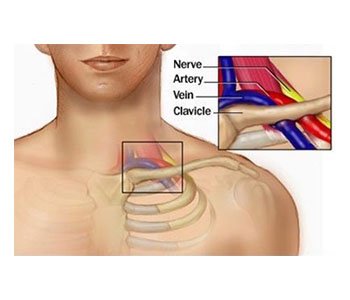Thoracic Outlet Syndrome

Thoracic outlet syndrome is a group of syndromes that happen when artery, vein or
nerves in the space between collarbone and first rib (thoracic outlet) are compressed.
This can cause pain in shoulder, neck and numbness in your arm, forearm, hand and
fingers.
Regular reasons for thoracic outlet syndrome incorporate physical injury from a car
accidents, sports-related exercises, certain anatomical deformities, (for example,
having an additional rib) and pregnancy. It is very important for specialists to decide
the reason for thoracic outlet syndrome.
Signs and side effects of vascular thoracic outlet syndrome can include:
- Discoloration of hand and fingers (bluish discoloration)
- Arm pain and swelling, potentially because of blood clots
- Blood clot in veins or supply routes in the upper territory of body
- Lack of blood circulation in the affected arm
- Cold fingers, hands or arms
- Arm weakness with movement
- Numbness or shivering in hand and fingers
There are mainly three types of thoracic outlet syndromes, including:
Neurogenic (neurological) thoracic outlet syndrome:
This type of thoracic outlet syndrome is described by pressure on the brachial plexus.
The brachial plexus is a system of nerves that originate from your spinal cord and
control muscle developments and sensation in your shoulder, arm and hand. In most
of thoracic outlet syndrome cases, the symptoms are neurogenic.
Vascular (Venous & Arterial) thoracic outlet syndrome:
This kind of thoracic outlet syndrome happens when at least one of the veins (venous
thoracic outlet syndrome) or conduits (arterial thoracic outlet syndrome) under the
collarbone (clavicle) are compressed or damaged.
Thoracic outlet syndrome symptoms can fluctuate, contingent upon which structures
are compressed.
See your specialist in the situation where you reliably experience any of the
symptoms of thoracic outlet syndrome.

